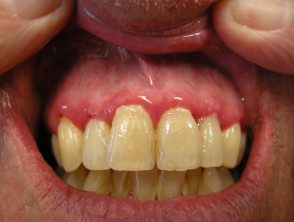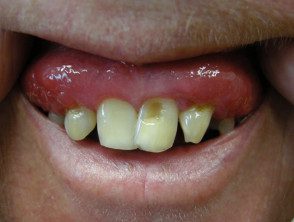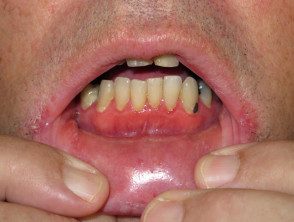What are gingivitis and periodontitis?
The gums are the gums, the visible mucous membrane around the teeth Gingivitis refers to inflammation of the gum, and it is common. It is a mild form of periodontitis, which means inflammation of all the tissues around the teeth, and is less common.
Periodontitis is a chronic, inflammatory disease affecting the gingiva, ligaments, and underlying alveolar bone. Periodontitis can lead to Soft fabric damage as well as tooth loss and bone destruction.
What are the signs and symptoms of gingivitis and periodontitis?
Patients with gingivitis present:
- Swelling, dark red, inflamed gums
- Sensitive gums that bleed easily.
- Bad breath
Patients with more advanced periodontitis may present:
- Tender, swollen gums that recede bright red or purple.
- New spaces between the teeth.
- Bad breath
- Pus between the teeth and gums
- Loose tooth
Gingivitis



What are the causes of gingivitis and periodontitis?
The main causes of gingivitis are:
- Poor oral hygiene, which leads to the accumulation of license plate. If teeth are not cared for properly, plaque hardens into tartar and irritates the gums
- Systemic disorders such as diabetes or leukemia, exposure to heavy metals, pellagra (niacin deficiency) and scurvy (vitamin C deficiency)
- Skin disease, particularly erosive lichen planus
Tartar buildup leads to periodontitis. Tartar irritates the gums and forms pockets that fill with bacteria, plaque and tartar. Subsequent infection can be serious
Who gets gingivitis and periodontitis?
Risk factors for gingivitis and periodontitis include:
- Hereditary factors
- Poor or inappropriate oral hygiene practices.
- Tobacco use
- Immune compromise
-
Viral and yeast infections
- Dry mouth
- Hormonal changes associated with menstruation and pregnancy.
- Poor nutrition
- Substance abuse
- Poorly fitting dental restoration
- Type 1 diabetes, leukemia, Down syndrome, Papillon-Lefevre syndrome and Crohn's disease.
What are the complications of gingivitis and periodontitis?
The biggest complication of untreated gingivitis is periodontitis. Complications derived from periodontist include:
- Loss of teeth
- Increased risk of coronary heart disease
- Increased risk of diabetes
- Increased risk of respiratory diseases such as asthma.
- Increased risk of rheumatoid arthritis
The link between periodontitis and increased risk for these serious chronic conditions is not fully understood.
How are gingivitis and periodontitis diagnosed?
The diagnosis of gingivitis and periodontitis is based on a thorough examination of the patient's mouth, including the cheeks, gums, and tongue. Probes can be used to examine gingival pockets
X-rays may also be taken to assess possible damage to the underlying bone structures.
How are gingivitis and periodontitis treated?
Treatment for gingivitis includes:
- Deep cleaning of the teeth (decalcification) to remove plaque and tartar
- Home care includes brushing at least twice a day with a soft bristle toothbrush, using mouthwash, and flossing.
- Regular dental checkups
- Treatment of underlying conditions
Additional treatment for periodontitis includes:
- Root planning to remove tooth root build-up.
- Oral antibiotics to treat infection
- Flap surgery
- Soft tissue grafts
- Bone grafts
- Guided tissue restoration
